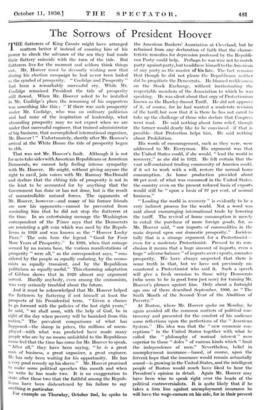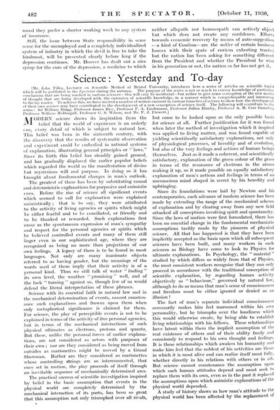The Sorrows of President Hoover
rill-1E flatterers of King Canute might have arranged I- matters better if instead of assuring him of his power to check the advance of the sea they had made their flattery coincide with the turn of the tide. But flatterers live for the moment and seldom think things out. Mr. Hoover must be devoutly wishing now that during his election campaign he had never been hailed as the symbol of prosperity. "Coolidge and Prosperity" had been a remarkably successful cry. While Mr. Coolidge remained President the tide of prosperity still flowed. When Mr. Hoover asked to be installed in Mr. Coolidge's place the reasoning of his supporters was something like this : "If there was such prosperity under Mr. Coolidge, who was an ordinary politician and had none of the inspiration of leadership, what abounding prosperity may we not expect when we are under that successful engineer, that trained administrator of big business, that accomplished international organizer, Mr. Hoover f" Unfortunately, shortly after Mr. Hoover's arrival at the White House the tide of prosperity began to ebb.
That was not Mr. Hoover's fault. Although it is not for us to take sides with American Republicans or American Democrats, we cannot help feeling intense sympathy with Mr. Hoover. He might, without giving anyone the right to cavil, join voices with Mr. Ramsay MacDonald and declare that the ebbing tide of prosperity is not in the least to be accounted for by anything that the• Government has done or has not done, but is the result of uncontrollable natural forces. The opponents of Mr. Hoover, however—and many of his former friends are now his opponents—cannot be prevented from reminding him that he did not stop the flatterers at the time. In an entertaining message the Washington correspondent of the Times says that the Democrats are reminting a gilt coin which was used by the Repub- licans in 1928 and was known as the "Hoover Lucky Piece." The coin bore the legend "Good for Four More Years of Prosperity." In 1928, when that coinage seemed by no means base, the various manifestations of prosperity "were all," as the correspondent says, "con- sidered by the people as equally enduring, by the econo- mists as equally transient, and by the Republican politicians as equally useful." This charming adaptation of Gibbon shows that in 1028 almost any argument served. Hardly anybody, even among the economists, was very seriously troubled about the future.
And it must be acknowledged that Mr. Hoover helped the flatterers by flattering if not himself at least the Prospects of his Presidential term. "Given a chance to go forward with the policies of the last eight years," he said, "we shall soon, with the help of God, be in sight of the day when poverty will be banished from this nation." The prevalent comparisons of what has happened—the slump in prices, the millions of unem- ployed—with what was predicted have made many people who are by no means unfaithful to the Republican cause feel that the time has come for Mr. Hoover to speak. " After all," they have been saying, "he is a great
man of business, a great organizer, a great engineer. lie has only been waiting for his opportunity. He has a very good remedy up his sleeve." Mr. Hoover promised to make some political speeches this month and when we write he has made two. It is no exaggeration to state after these two that the faithful among the Repub- licans have been disheartened by his failure to say anything in particular.
For example on Thursday, October 2nd, he spoke to
the American Bankers' Association at Cleveland, but he refrained from any declaration of faith that the charac- teristic remedies for depression professed by the Republi- can Party could help. Perhaps he was wise not to match party against party, but to address himself to the American of any party as the master of his fate. The fact remains that though he did not please the Republicans neither did he propitiate the Democrats. Ile blamed reekle,,ness on the Stock Exchange, without incriminating the respectable members of the Association to which he was speaking. He was silent about that orgy of Protectionism known as the Hawley-Smoot Tariff. He did not approve of it, of course, for he had wanted a moderate revision of the tariff, but now that it is there he has not cared to take up the challenge of those who declare that Congres., went mad. He said nothing about farm relief, though the farmer would dearly like to be convinced—if that is possible—that Protection helps him. He said nothing about Prohibition.
His words of encouragement, such as they were, were addressed to Mr. Everyman. His argument was that the United States could, if she would, " lead the world in recovery," as she did in 1922. He felt certain that the vast self-contained trading community of America could, if it set to work with a will, restore the normal home consumption. As home production provided about 90 per cent, of what was consumed in the United States, the country even on the present reduced basis of exports would still be "upon a basis of 97 per cent, of normal business."
"Leading the world in recovery" is evidently to be a very indirect process for the world. Not a word was said about encouraging international trade by lowering the tariff. The revival of home consumption is merely to entail the purchase of more foreign goods, for, as Mr. Hoover said, "our imports of commodities in the main depend upon our domestic prosperity." Inciden- tally that is a strange argument for a Protectionist— even for a moderate Protectionist. Pressed to its con- clusion it means that a huge amount of imports, even a huge" adverse balance " of imports over exports, connotes prosperity. We have always suspected that there is some truth in that, but we have not previously en- countered a Protectionist who said it. Such a speech will give a fresh occasion to those witty Democrats (who seem to be in good form just now) for turning Mr, Hoover's phrases against him. Only about a fortnight ago one of them described September, 1930, as "The Sixth Month of the Second Year of the Abolition of Poverty."
At Boston, where Mr. Hoover spoke on Monday, lie again avoided all the common matters of political con- troversy and presented for the comfort of his audience some reflections upon the perfections of the "American System." His idea was that the "new economic con- ceptions" in the United States together with what he called the "philosophy of mutual interest" were superior to those " doles " of various kinds which "limit the independence of men." Nevertheless, belief in unemployment insurance—based, of course, upon the fervent hope that the insurance would remain actuarially sound—is growing in the United States, and the intelligent people of Boston would much have liked to hear the nesident's opinion in detail. Again Mr. Hoover may have been wise to speak right over the heads of the political controversialists. It is quite likely that if he takes a firm line against unemployment insurance he will have the wage-earners on his side, for in their present. mood they prefer a shorter working week to any system of insurance.
Still, the issue between State responsibility in some sense for the unemployed and a completely individualized system of industry in which the devil is free to take the hindmost, -will be presented clearly before long if the depression continues. Mr. Hoover has dealt out a nice syrup for the cure of the depression, a medicine to which
neither allopath nor homoeopath can actively object but which does not create any confidence. Efforts towards economic recovery by means of auto-suggestion —a kind of Coueism—are the métier of certain business houses with their spate of curious exhorting tracts ; but the nation has been asking for something different from the President and whether the President be wise in his generation or not, the nation so far has not got it,









































 Previous page
Previous page